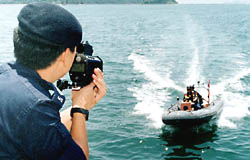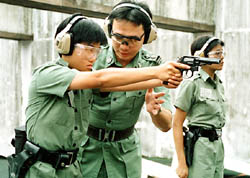



















|
| |
 Marine Police officer demonstrating the accuracy of the new laser guns. Police have begun a summer crack down on speeders and unlicensed operators of pleasure craft |
MARINE POLICE will step up enforcement actions
against speeding and unlicensed operations of pleasure vessels in Hong Kong waters.
Speaking at a press conference last week, Divisional Commander (East Division) of the Marine Police, Poon Tze-chung, said the actions aim at improving water safety and deterring unqualified persons from operating pleasure vessels. The number of checks on pleasure craft has already markedly increased following the deaths of two persons in a jet ski accident in 1996 and the drowning of a boy in a capsized sampan accident last year. The majority of summonses issued in 1996 and 1997 were for vessels underway without a qualified master or engineer. |
|
"We are also considering actions against owners of pleasure craft who permit their vessels to be operated by unqualified people," Mr Poon said. Despite continuous effort to remind masters and operators of marine craft to engage in a safe speed, speeding remains a major problem, Mr Poon said, noting that among the 1,062 summonses issued last year, 137 were for speeding at sea, almost double the figure, 77 in 1996, while there were only 10 summonses for speeding in 1995. "Up to April 21 this year, a total of 21 vessels have been summonsed for speeding offences," he said. To tackle the problem more effectively, the Marine Police have recently procured five laser guns at a cost of $40,000 each. Their introduction will make the job of mounting anti-speeding operations less manpower intensive and eventually detect more lawbreakers. Laser signals beamed out from the gun are reflected back to the device when they hit a target, producing a record (admissible as evidence in court) indicating the speed of the target. "Because the gun is simple to operate, only one officer is required rather than the usual ten performing speed detection duties utilising such conventional methods as a stop watch or a launch radar," Mr Poon said. He also noted that greater emphasis will be placed on enforcing speed-restricted zones this year, particularly on weekends and public holidays. A maximum speed of five knots is imposed from 8am until midnight on Saturdays, Sundays and public holidays and any day during the period from July 1 to September 15. The maximum penalty for exceeding the speed limit is a $2,000 fine. There are eight designated speed restricted zones for pleasure vessels in Sai Kung/Clear Water Bay area: Tai She Wan, Tsam Chuk Wan, Pak Sha Wan (Hebe Haven), East Kiu Tsui Chau, West Kau Sai Chau, South Kau Sai Chau, Bluff Island and Clear Water Bay. In Hong Kong south and Tolo Harbour, the designated speed restricted zones include: Yeung Chau-Plover Cove, Sha Tin Hoi, Cheung Chau-Tung Wan, Lamma Island-Shum Wan and Luk Chau Wan, Deep Water Bay, South Bay, Chung Hom Wan, Stanley Bay, Tai Tam Harbour and To Tei Wan. Besides actions against speeding and unlicensed operations of pleasure vessels, Marine Police also assist the Marine Department in conducting routine checks on safety equipment of pleasure vessels, jet skis and water scooters. Meanwhile, anti-shark patrols have been activated in shark infested areas, and in the event of a shark sighting, police officers at the scene will issue appropriate warnings to swimmers. | |
| |
 | DRILL & MUSKETRY INSTRUCTOR
Terry Lee Yat-Wing had done it all. A force Entry Officer advanced to senior
inspector in '94, Terry transferred to PTS in November'95 from PTU and OPs Wing.
"I didn't actually want to be a DMI (Drill & Musketry Instructor), having been a CID officer for many years, but my old DMI, Chief Inspector Cliff Chow Kwok-kei, told me how interesting the work is - more than just drill and musketry," recalled the 39-year-old Lee. |
|
Subsequently Lee attended the training courses required to become a fully qualified instructor: the student instructors course, the foot-drill instructors course and the firearms and tactics instructors course-a total of 11 weeks in-service training. Said Lee: "I took up my first probationary inspector (PI) intake in March'96 - PIs 428-430 - which comprised 35 young men and women from all walks of life; eight Force-entry officers and the rest fresh from university and occupations such as banking, teaching, public relations and secretarial work. I felt this was a heavy responsibility for me but I derived considerable confidence from my training courses." The imposing six-foot uniformed figure of DMI Y W Lee was the first contact with the staff of the Police Training School these 35 new trainees had as they entered the gates of PTS on their first day. And it was mostly him they saw for the next four weeks. "My job was to shape and mould these individuals into a cohesive and co-ordinated team," DMI Lee recalled. "How I did that was up to me. I realised that setting a perfect example of officer quality was essential; not just a smart turnout but my behaviour, command ability, deportment and even my manners were important. I also knew that I had to create a constructive balance between the tough discipline expected of a police officer and the caring, considerate and understanding side of the Force. There is a common misconception that discipline is taught through fear." Over those formative weeks of training Terry Quickly got to know the characters under his command. In his drill sessions, classroom lessons, up on the firing ranges and also relaxing in the Mess, he gained their confidence and, in turn, learned their strengths and weaknesses. He encouraged the weaker ones and motivated the stronger. Said Lee: "I remember one PI whose drill movements were unacceptable; worse than everyone else's because he was uncoordinated and couldn't concentrate. I observed that he was keen but that, with each mistake, his confidence deteriorated further. Deciding that I had to be cruel to be kind, I nominated him as commander of a recruit police constable (RPC) squad on his first Commandant's Inspection Parade." "Reduced to a bundle of nerves, he came to see me after school. I then spent an hour or so with him, starting with the reason for his being at PTS and working up through the steps of becoming an effective leader of men and women. In the end he convinced himself to take a wider perspective of his command, realising that he is part of a team, not alone, and that mistakes were expected and tolerated. With the pressure relieved he went on to perform quite well at that inspection parade and never looked back." One of the important roles of a Drill & Musketry Instructor is being the link between the CIP intake director and the trainees. Most PIs prefer to confide in the lesser ranking and younger instructor, thus ensuring that problems are brought to light and frustrations are not bottled up. Said Terry Lee: "My DMI colleague, Paul Wong Wai-ming, had a direct-entry WPI in his intake who could not come to terms with the disciplined life at PTS. This was manifested in her initial fear of firearms, slow reaction to commands and inability to march. In her frustration, she went to see him in tears and said she wanted to resign believing she had made a mistake in choosing a police career." "But in those first six weeks Paul had recognised some basic qualities of a police inspector in her self-confidence through counselling and coaching. Eventually she conquered her fear of guns and learned how to deal with the discipline. That young lady went on to win the baton of honour in her squad!" Asked what the main attraction is to being a DMI, Terry Lee explained: "The process of training fresh recruits, from the raw material to the finished, polished product has given me great job satisfaction. In my two years as a DMI I have helped trainees grow up into fine examples of police officers, believing in our vision, truly living our values and being an asset to the Force." As for promotion prospects and general career development, Terry said that he has become a wiser counsellor, a skilled technician and an efficient manager of resources. With all of this reflected in a correspondingly enhanced record of service, Terry is confident that he is now a much more competitive candidate for promotion. | |

